That Old Black Dog of Fear
by Linda Rodriguez
People are afraid of many things. The saddest is the fear of
black cats and dogs. Because of this fear, more black cats and dogs are
euthanized by kill shelters than other colors. People are afraid to adopt them
because they’re black, and these shelters, which usually have to euthanize
because they’re public shelters and have to keep taking in all surrendered/lost
pets brought to them, must kill them when they’ve been there too long and space
gets short. Because of this problem, many of these shelters periodically offer
“sales” on black cats and dogs—half-off adoption fees, very low adoption fees,
even sometimes no adoption fees.
black cats and dogs. Because of this fear, more black cats and dogs are
euthanized by kill shelters than other colors. People are afraid to adopt them
because they’re black, and these shelters, which usually have to euthanize
because they’re public shelters and have to keep taking in all surrendered/lost
pets brought to them, must kill them when they’ve been there too long and space
gets short. Because of this problem, many of these shelters periodically offer
“sales” on black cats and dogs—half-off adoption fees, very low adoption fees,
even sometimes no adoption fees.
The prejudice against black cats and dogs goes back a long way
to old superstitions about them being the devil’s animals and being bad luck. I
could trace these legends back to their beginnings in the battle between
religions where the animals were simply used as props and propaganda weapons by
the warring sides, but I’m not going to burden my blog with that today. It’s a
shame that companion animals have to be dragged into our human quarrels in this
way.
to old superstitions about them being the devil’s animals and being bad luck. I
could trace these legends back to their beginnings in the battle between
religions where the animals were simply used as props and propaganda weapons by
the warring sides, but I’m not going to burden my blog with that today. It’s a
shame that companion animals have to be dragged into our human quarrels in this
way.
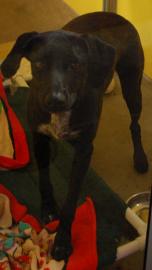 The only thing sadder than a rejected black pet is an older cat
The only thing sadder than a rejected black pet is an older cator dog who’s also black. No one wants these. You combine the prejudice against
older animals with the prejudice against black animals and come up with a stone
wall these cats and dogs can’t get over, no matter how sweet, cute, bright,
well-behaved, and gentle they are. If you talk to anyone in the rescue business
or look on any of their websites, you’ll quickly find that this is a sad, basic
truth in the world of those who care for and try to find permanent homes for
older, black pets.
The silliest part of it, to me, is that the pet doesn’t even
have to be all black, certainly not if it’s a dog. Check out your local humane
shelter’s “black dog sale,” and you’ll find that dogs that are only part black
are included in the sale because they’re included in people’s prejudices
against black animals. My own last rescue dog was a Plott hound with the typical
brindle brown coat, but because he had a black saddle on his back, he was
deemed a black dog and unadoptable.
have to be all black, certainly not if it’s a dog. Check out your local humane
shelter’s “black dog sale,” and you’ll find that dogs that are only part black
are included in the sale because they’re included in people’s prejudices
against black animals. My own last rescue dog was a Plott hound with the typical
brindle brown coat, but because he had a black saddle on his back, he was
deemed a black dog and unadoptable.
Rescue and shelter animals have enough prejudice against them.
Every year, approximately 3-4 million cats and dogs are euthanized in shelters.
These are animals people gave up and threw out, or the offspring of such
animals. It’s getting worse because many families have lost homes and been
forced to move to apartments that refuse animals, causing them to surrender
family pets if they can’t find friends to take them. Yet still, people pay big
bucks to buy dogs and cats from breeders—and oddly enough, many of those
wanted, purchased purebred dogs and cats (but more often dogs) find their ways
into shelters around the country. I’ve been taking in shelter dogs all my adult
life, and I’ve noticed a big change there. It used to be rare to find a
purebred animal at a shelter. Now, they’ve all got some, and often quite a
number of them.
Every year, approximately 3-4 million cats and dogs are euthanized in shelters.
These are animals people gave up and threw out, or the offspring of such
animals. It’s getting worse because many families have lost homes and been
forced to move to apartments that refuse animals, causing them to surrender
family pets if they can’t find friends to take them. Yet still, people pay big
bucks to buy dogs and cats from breeders—and oddly enough, many of those
wanted, purchased purebred dogs and cats (but more often dogs) find their ways
into shelters around the country. I’ve been taking in shelter dogs all my adult
life, and I’ve noticed a big change there. It used to be rare to find a
purebred animal at a shelter. Now, they’ve all got some, and often quite a
number of them.
I can’t stress enough how important I feel it is to give homes
to shelter/rescue cats and dogs, if you can and if you are looking for a pet.
They make grateful, loyal, and affectionate pets, and you’re quite literally
saving a life when you do. And while you’re looking for a good pet at your
local shelter, please, please don’t bypass the older, black animals in your
search. Older, black cats and dogs are at the highest risk of being euthanized
because no one wants them. Take one home and bask in its love and affection.
You’ll be glad you did as the years in company with your faithful pet slip
past.
to shelter/rescue cats and dogs, if you can and if you are looking for a pet.
They make grateful, loyal, and affectionate pets, and you’re quite literally
saving a life when you do. And while you’re looking for a good pet at your
local shelter, please, please don’t bypass the older, black animals in your
search. Older, black cats and dogs are at the highest risk of being euthanized
because no one wants them. Take one home and bask in its love and affection.
You’ll be glad you did as the years in company with your faithful pet slip
past.
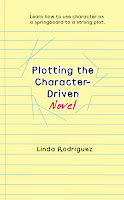 Linda Rodriguez’s 11th book, Fishy Business: The Fifth
Linda Rodriguez’s 11th book, Fishy Business: The FifthGuppy Anthology (edited), was recently published. Dark Sister: Poems
is her 10th book and was a finalist for the Oklahoma Book Award. Plotting
the Character-Driven Novel, based on her popular workshop, and The World
Is One Place: Native American Poets Visit the Middle East, an anthology she
co-edited, were published in 2017. Every
Family Doubt, her fourth mystery featuring Cherokee detective, Skeet
Bannion, and Revising the Character-Driven Novel will be published in 2020.
Her three earlier Skeet novels—Every
Hidden Fear, Every Broken Trust, Every Last Secret—and earlier books of
poetry—Skin Hunger and Heart’s Migration—have received critical
recognition and awards, such as St. Martin’s Press/Malice Domestic Best First
Novel, International Latino Book Award, Latina Book Club Best Book of 2014,
Midwest Voices & Visions, Elvira Cordero Cisneros Award, Thorpe Menn Award,
and Ragdale and Macondo fellowships. Her short story, “The Good Neighbor,”
published in Kansas City Noir, has
been optioned for film.
Rodriguez is past chair of the AWP Indigenous Writer’s
Caucus, past president of Border Crimes chapter of Sisters in Crime, founding
board member of Latino Writers Collective and The Writers Place, and a member
of International Thriller Writers, Native Writers Circle of the Americas,
Wordcraft Circle of Native American Writers and Storytellers, and Kansas City Cherokee
Community. Learn more about her at http://lindarodriguezwrites.blogspot.com
Caucus, past president of Border Crimes chapter of Sisters in Crime, founding
board member of Latino Writers Collective and The Writers Place, and a member
of International Thriller Writers, Native Writers Circle of the Americas,
Wordcraft Circle of Native American Writers and Storytellers, and Kansas City Cherokee
Community. Learn more about her at http://lindarodriguezwrites.blogspot.com



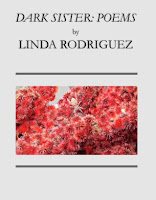
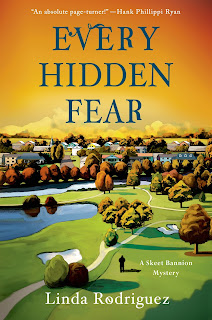
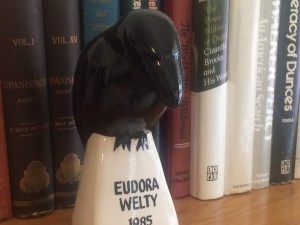

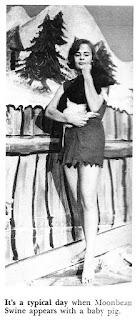
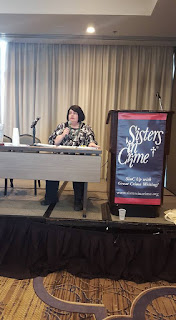



I hadn't realized that black dogs were included in that prejudice. A shelter here named black kitten Jellybean, to make it seem cuter, and it worked so well that now all black kittens there are called Jellybean. Another group matches older pets with older persons, adding a promise to find a new home if the person becomes unable to care for a pet. The more sedate elder pets are much easier to care for; my friend loves having a Lab well past the running-away stage of life. My allergies preclude furry housemates, which my nephew declared "too bad, because I know you could give that dog a good home" — when the Muny's production of ANNIE included an adoption table at intermission, not for Sandy but for the dog "extras" caught by the dog catcher.
Yes, Mary, black dogs as well as black cats.